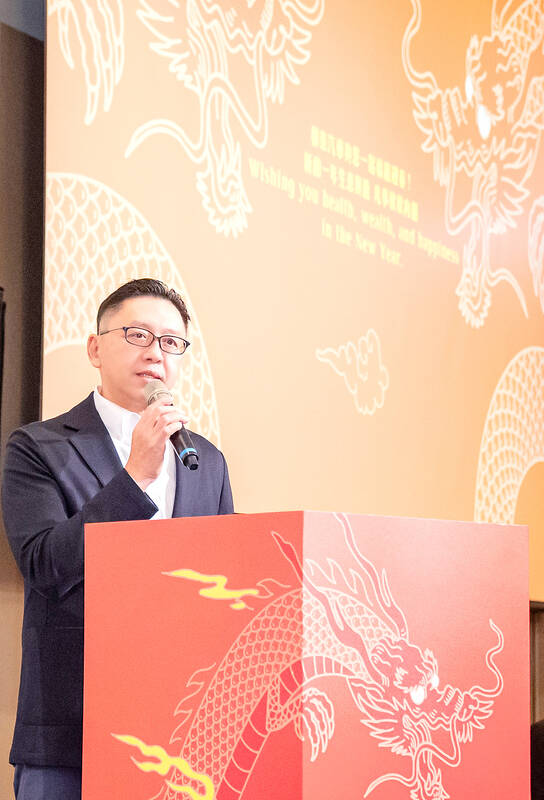Hotai Motor Co (和泰汽車), which distributes Lexus, Toyota and Hino models in Taiwan, yesterday said it aimed to boost vehicle sales this year to a new record, benefiting from the introduction of new models and stable automobile production amid improved chip supply.
Hotai’s goal is to increase its vehicle sales this year to about 170,000 units after scoring a historical high sales figure of 166,000 units including commercial vehicles last year, the company said. If not, the distributor would see a 2.4 percent annual increase in car sales this year.
That sales growth would help Hotai grab a larger slice of the domestic market of about 37.8 percent, this year, the company said.

Photo courtesy of Hotai Motor Co
Hotai has maintained its position as the nation’s top car distributor for 22 years with its market share rising to 34.9 percent last year, the company said.
Addressing consumers’ replacement demand, Hotai plans to introduce new models, including a major revamp to Toyota’s Camry sedan and Toyota GR Yaris, a sport compact car, in the fourth quarter, Hotai president Justin Su (蘇純興) said in a company statement.
In addition, Lexus’ new LBX model hit the market last month and a new electric series, UX 300h, would be available soon, he said.
On the commercial vehicle side, Hotai plans to introduce Toyota’s H2 City Gold electric bus powered by hydrogen later this year, matching local governments’ promotion of electrification of urban bus fleets, Su said.
Last year was a phenomenal year for Taiwan’s auto market with overall new vehicle sales climbing 11 percent year-over-year to 476,987 units, hitting the highest level in 18 years, government data showed.
Su expects domestic new car sales to come down to a normal level of 450,000 units this year, thanks to an extension of government incentives for purchasing new cars.
Besides, global automakers have seen car production return to normal, ending a prolonged supply crunch, he said.
However, geopolitical tensions and the central banks’ interest rate policy remained major uncertainties that would affect market sentiment, he said.

In Italy’s storied gold-making hubs, jewelers are reworking their designs to trim gold content as they race to blunt the effect of record prices and appeal to shoppers watching their budgets. Gold prices hit a record high on Thursday, surging near US$5,600 an ounce, more than double a year ago as geopolitical concerns and jitters over trade pushed investors toward the safe-haven asset. The rally is putting undue pressure on small artisans as they face mounting demands from customers, including international brands, to produce cheaper items, from signature pieces to wedding rings, according to interviews with four independent jewelers in Italy’s main

Japanese Prime Minister Sanae Takaichi has talked up the benefits of a weaker yen in a campaign speech, adopting a tone at odds with her finance ministry, which has refused to rule out any options to counter excessive foreign exchange volatility. Takaichi later softened her stance, saying she did not have a preference for the yen’s direction. “People say the weak yen is bad right now, but for export industries, it’s a major opportunity,” Takaichi said on Saturday at a rally for Liberal Democratic Party candidate Daishiro Yamagiwa in Kanagawa Prefecture ahead of a snap election on Sunday. “Whether it’s selling food or

CONCERNS: Tech companies investing in AI businesses that purchase their products have raised questions among investors that they are artificially propping up demand Nvidia Corp chief executive officer Jensen Huang (黃仁勳) on Saturday said that the company would be participating in OpenAI’s latest funding round, describing it as potentially “the largest investment we’ve ever made.” “We will invest a great deal of money,” Huang told reporters while visiting Taipei. “I believe in OpenAI. The work that they do is incredible. They’re one of the most consequential companies of our time.” Huang did not say exactly how much Nvidia might contribute, but described the investment as “huge.” “Let Sam announce how much he’s going to raise — it’s for him to decide,” Huang said, referring to OpenAI

The global server market is expected to grow 12.8 percent annually this year, with artificial intelligence (AI) servers projected to account for 16.5 percent, driven by continued investment in AI infrastructure by major cloud service providers (CSPs), market researcher TrendForce Corp (集邦科技) said yesterday. Global AI server shipments this year are expected to increase 28 percent year-on-year to more than 2.7 million units, driven by sustained demand from CSPs and government sovereign cloud projects, TrendForce analyst Frank Kung (龔明德) told the Taipei Times. Demand for GPU-based AI servers, including Nvidia Corp’s GB and Vera Rubin rack systems, is expected to remain high,